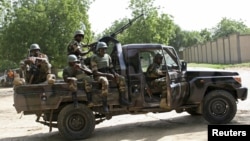A senior official at the Economic Community of West African States (ECOWAS) says other regional blocs can learn from policies the West African group of nations has implemented to combat violent extremism in the region.
Remi Ajibewa, the ECOWAS director for political affairs, said member nations have been sharing intelligence and information as part of an effort to combat numerous terror organizations, including the Nigeria-based Islamist militant group Boko Haram, whose cross-border attacks in Nigeria, Niger, Chad and Cameroon has affected socio-economic activities in area.
Speaking on a panel on violent extremism at the U.N. headquarters in New York, Ajibewa said the ECOWAS bloc's rich body of counterterrorism experience includes the National and Regional Counter Terrorism Strategic Level Trainings, along with the strengthening and harmonizing of legal frameworks across member states.
Ajibewa also said all ECOWAS members have established financial intelligence units to control regional cash flows and monitor illicit financial transactions that fund violent activities.
Speaking shortly after Islamist militants attacked a hotel in Mali’s capital, Bamako, Ajibewa called for a focus on the root causes of terrorism, adding that ECOWAS’ conflict prevention framework, which has been adopted by heads of state across the region, seeks to resolve issues that often lead to violent extremism.
“It includes early warning, preventive diplomacy, disarmament, peace and development," he said. "It also involves the ECOWAS standby force, education, and [promotion of] democracy."
He described root causes of terrorism as traceable to social inequality and "grievances that have been forged out by some of these people who believe that they have been marginalized.”
“We have what we call the committee of [military] chiefs of staff of member states and the committee of police chiefs, these are some of the lessons that other regions can learn from with these committees," he said. "They have the sharing of information.”
He also cited specific lessons learned by member states, describing Nigeria's Countering Violent Extremism (CVE) program, which he described as a soft approach to raising awareness of the threat of violent extremism that also shapes counterterror policy and programming.
“In Nigeria, they are not only looking for the palliative measures," he added, touching on Abuja's development a social reintegration program for the deradicalized. "The issue of reintegration is another point, [and] Nigeria has already set up a center. So, all major partners from other countries have been focusing on the military perspective, ignoring the victims as well as even those that have left that terrorist enclave.”
Ajibewa says ECOWAS is cooperating with the neighboring regional bloc, the Economic Community of Central African States, in the fight against Boko Haram and other violent extremists groups.
“Their member states share information with the ECOWAS region — not only intelligence reports, they also communicate and do what we call lessons learned so that we will all be able to improve," he said. "That is why we have the multi-international task force which has been assisting in that area.”




